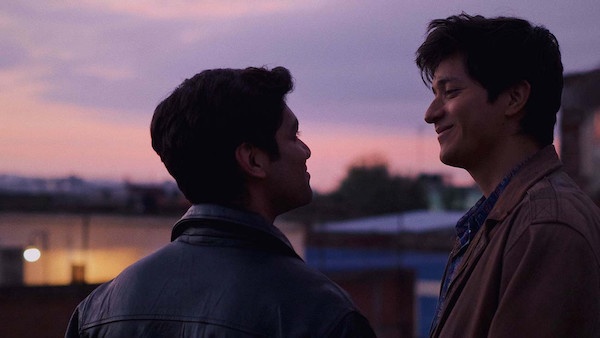Film Review: “I Carry You with Me” — An Immigrant’s Epic Story of Sacrifice and Love
By Erica Abeel
The delicious cheekiness of the film is to present a story about two gay immigrants as a swooning romantic epic spanning years.
I Carry You with Me, directed by Heidi Ewing. Screening at Kendall Square Cinema starting from June 25.

A scene from I Carry You with Me.
I Carry You with Me from Sony Pictures Classics is a sweeping, innovative film that checks all the boxes for timeliness. The first narrative feature by Oscar-nominated documentary filmmaker Heidi Ewing (Jesus Camp), it audaciously melds elements that don’t ordinarily cohabit: an epic love story about Ivan and Gerardo, two gay men from Puebla, Mexico, and an immigrant saga about the search for the American Dream. As well, Ewing turns to a hybrid form that draws on elements of documentary, with the actual men who inspired the story (and happen to be her longtime friends) playing their older selves, while actors reenact youthful scenes from their burgeoning romance.
I Carry You with Me is a memory piece that circles back to where it begins. It opens with the voice-over of the real life Ivan in New York, relating a dream about his longing for his family, particularly his son, from who he is cruelly separated. From there the film fluidly shuttles back and forth to piece together an impressionistic account of Ivan’s and Gerardo’s journey from Mexico to New York, from past to present and back again.
A devoted father, Ivan (Armando Espitia) remains closeted in notably homophobic Mexico; the boy’s mother would bar him from seeing his son if she learned he was gay. He’s a trained chef, but his restaurant gig is limited to washing dishes and playing fix-it guy in a country with scant opportunities for advancement. At a secret gay bar Ivan encounters handsome Gerardo (Christian Vasquez) and, after a tentative beginning, they fall in love. Both are scarred by a homophobic culture. Unlike Ivan, Gerardo refuses to “pass,” and is treated with hostility by his well-off family. In a flashback, Ivan is roughly chastised for posturing in his sister’s ruffled finery for her quinceañera.
Mid-affair, Ivan tells Gerardo he has decided to “pass over” and make the harrowing journey to the US. “You’re a complicated man to have as a boyfriend,” Gerardo says ruefully. They promise to reunite after a year. But time drags on. In New York Ivan feels alone and reviled – “they hate us here,” a Mexican friend says — and stuck in dead-end jobs. The (shredded) American Dream is slow to materialize. One despairing wintry night Ivan returns from work to find Gerardo seated on his stoop. Cue the violins – but the heart-rending scene is the stronger for being presented matter-of-factly. With this couple love is the engine, inspiring the care-taking Ivan to pursue the arduous trek from line cook to chef to restaurant owner.
The delicious cheekiness of the film is to present a story about two gay immigrants as a swooning romantic epic spanning years. These are men who might serve as the background furniture in the lives of the more privileged, the pizza guys, hedge clippers, office cleaners – all the invisible people who, as Jesse Jackson memorably said, “take the early bus.” How refreshing that Ewing gives them the full Hollywood treatment of a grand romance.
The film is complex in structure – I gather it took eight years to get off the ground – weaving together present and past, and shifting between the two real men and the actors. At first this makes for an uneasy meld, but once you become involved in the fates of these characters, the mix of documentary and narrative feels natural. The thumbprint of Terrence Malick is all over the film: the narrator’s voice-overs, the scenes shot at the magic hour of dusk, the dreaminess and mystery of the ordinary. The lovely, gentle face of Armando Espitia as Ivan embodies a human decency that pervades the film. In a riposte to all the Trumpian ugliness about immigrants, these men carve out a life marked by great sacrifice and buoyed by enduring love.
Erica Abeel is a novelist, film and cultural critic, and former professor at CUNY. Her most recent novel Wild Girls, about three women rebels of the ’50s, was an Oprah Magazine pick. Her journalism has appeared in the New York Times, Indiewire, and other major sites and national publications. A former dancer, when not writing she’s in a Pilates class or at the barre. Her new novel, The Commune, will be published by Adelaide Books in July 2021.


wonderful review – as always, insightful and makes me want to see it right away.